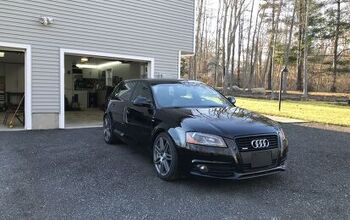Gas War: Senator Asks EPA Watchdog to Investigate New Fuel Efficiency Rules

Every time we think the United States’ fueling fracas had concluded, something new emerges to remind us that we’re utter morons. Despite the Trump administration finally wrapping up the fuel rollback of Obama-era emission standards on March 31st, Senator Tom Carper (D-DE) has sent another letter asking Environmental Protection Agency Inspector General Sean O’Donnell to look into the new rules.
Carper asked the inspector general last February to conduct an investigation into “potentially unlawful efforts and procedural problems” stemming from their implementation. His assertion is that the EPA was circumventing various procedural requirements and attempted to hide data that would have conflicted with some of the rollback’s claimed benefits.
Did it?
Truth be told, some of the metrics used to rationalize the rollback were suspect to us, as well. Safety claims seemed particularly overblown, but the administration likely felt it had to invoke some kind of scare tactic because that’s the only way to get things done.
Want to make EVs more appetizing or create a rigid framework for fueling regulations? Say that the environment is at death’s door and ignore the perils of battery production.
Want to get autonomous vehicles greenlit for public testing? Suggest that thousands will die every year the technology is not in play, even though it’s nowhere near ready.
Want to roll back hastily passed regulations? Say they’re at odds with market realities and cap it off by suggesting it might lead to less-safe automobiles using suspect reasoning.
Voila!
This tactic works great for closing down entire states, too. Heck, we just enjoyed almost years of evidence-free investigations into White House corruption claims and now have new probes suggesting it was the actually the previous administration that was out of line with its activities — with a familiar deficit of available evidence. Is there anything to it? We can’t say and doubt the truth will have much influence on how it’s handled. All we can do is wish you luck in your efforts to find straight answers and offer aid wherever we can.
With all the above in mind, Carper’s questioning seems mostly valid. There were plenty of criticisms thrown at the EPA’s handling of the rollback and it hardly seemed involved in the early drafts. But there were also a number of groups getting in its way, and most of it came down a partisan standoff. Half the country seems convinced pursuing ever-higher efficiency standards will effectively force automakers into building cars totally unfit for the North American market just to appease regulations. The opposition believes environmentalism takes precedence over sales and that any step backwards is unacceptable.
You probably fall into one of these categories or, like me, are a disgusting fence-sitting loser who’s trying to parse through self-serving rhetoric to find out what will actually work for the country. Sadly, there may be no middle ground when politics are involved — and they assuredly are in this case.
Donald Trump’s rollback of Obama-era vehicle emissions standards actually offered a fair bit of compromise in its final draft. Completed on March 31st, the new rules actually mandate an annual increase in efficiency of 1.5 percent through 2026. The original version simply froze the old standard at 2020 levels, yet there’s still plenty of criticism being thrown around.
Many do not like that the fuel rollback suspends California’s ability to set its own targets and feel more should be done to protect the environment. However, you’ll find just as many people critical of the Golden State for trying to strong-arm higher standards for the rest of the country and who feel the Obama administration’s fuel goals were wildly unrealistic. In fact, its own 2016 mid-term review, conducted by the EPA, National Highway Traffic Safety Administration (NHTSA) and California Air Resources Board (CARB), actually claimed those standards weren’t feasible in the long term.
It should also be said that assessment was made in an era where fuel prices were relatively high and passenger car volumes still outpaced pickups and SUVs by a wide margin.
That leaves this author wanting to embrace the rollback more than shun it, provided rules continue to incentivize automakers to keep pursuing better efficiency at a reasonable pace. Carper’s grievances, however, are less about what the rules will do to the air or economy and more about how this all came into being. Here are the bulleted issues from his letter to Inspector General O’Donnel:
[The Department of Transportation] was the sole author of most, if not all, of the draft final rule submitted in January to [the White House Office of Management and Budget]. After EPA reviewed the materials, EPA Acting Administrator Idsal was briefed on EPA career staff’s concerns with the draft final rule and was made aware that it was not an EPA-co-authored product.
Four hard copies of EPA’s concerns were sent to DOT on February 5, but EPA political officials apparently purposefully and potentially illegally withheld these documents from being placed into the rulemaking docket and made available to the public.
The concerns EPA sent to DOT on February 5 catalogued numerous errors and inaccuracies in the draft final rule, but DOT did not incorporate most of EPA’s feedback. In fact, EPA reviewed a second draft of the rule on March 25 and observed internally that the continued failure to correct many of these errors would leave the rule legally vulnerable.
After the final rule was signed, the Agencies made significant changes to it before it was published in the Federal Register, raising transparency and potential legal questions associated with what appears to be an unprecedented process used to alter the materials.
The Inspector General’s Office has confirmed it received the letter on Monday ( which is available to read here, along with Carper’s earlier memo from February). In our eyes, the end goal seems to be proving the rollback was mishandled so it can be obliterated — cinching a surprise victory for those opposing it.
“These materials describe a fundamentally and legally flawed rule created by what may be the most procedurally problematic process my office has ever reviewed,” Carper stated in his letter.
Assuming some sort of legitimate malfeasance was going on, we’d like to know more about it, though we haven’t ruled this out as a political smokescreen or the opening action of a prolonged legal battle surrounding the rollback. Likewise, much of the criticism tossed at the rollback could be used against the Obama administration’s decision regarding the old rules. Both appeared to ignore facts in order to push ahead to the desired outcome. Naturally, both were chided by the opposing party for those very shortcomings.
[Image: Siripatv/Shutterstock]

A staunch consumer advocate tracking industry trends and regulation. Before joining TTAC, Matt spent a decade working for marketing and research firms based in NYC. Clients included several of the world’s largest automakers, global tire brands, and aftermarket part suppliers. Dissatisfied with the corporate world and resentful of having to wear suits everyday, he pivoted to writing about cars. Since then, that man has become an ardent supporter of the right-to-repair movement, been interviewed on the auto industry by national radio broadcasts, driven more rental cars than anyone ever should, participated in amateur rallying events, and received the requisite minimum training as sanctioned by the SCCA. Handy with a wrench, Matt grew up surrounded by Detroit auto workers and managed to get a pizza delivery job before he was legally eligible. He later found himself driving box trucks through Manhattan, guaranteeing future sympathy for actual truckers. He continues to conduct research pertaining to the automotive sector as an independent contractor and has since moved back to his native Michigan, closer to where the cars are born. A contrarian, Matt claims to prefer understeer — stating that front and all-wheel drive vehicles cater best to his driving style.
More by Matt Posky
Latest Car Reviews
Read moreLatest Product Reviews
Read moreRecent Comments
- ToolGuy I might be Batman.
- Lou_BC Well, I'd be impressed if this was in a ZR2. LOL
- Lou_BC This is my shocked face 😲 Hope formatting doesn't fook this up LOL
- Lou_BC Junior? Would that be a Beta Romeo?
- Lou_BC Gotta fix that formatting problem. What a pile of bullsh!t. Are longer posts costing TTAC money? FOOK


































Comments
Join the conversation
Yes I agree but in the meantime I still want my electricity even if its fossil fuel. There are plenty of sources of clean energy but there needs to be a plan.
Honda. It's all I've ever owned. It began in '82 with my first car, a brand new Accord Hatchback 5 speed. I kept it for five years, then traded it for a brand new '87 Prelude, a car I wish I still had. Seven years later, I traded it in for a brand new '94 Prelude Si. I kept it for seven years until a woman in an Expedition turned left in front of me on red. She was cited, but my 'Lude was a total loss. It was seven years old, perfect shape, and had